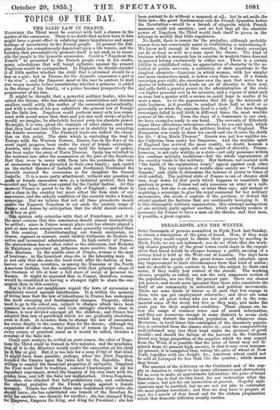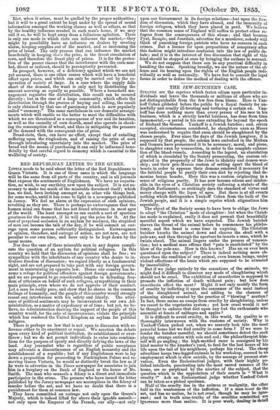BREAD-RIOTS, AND THE WINTER.
Soars thousands of persons assembled in Hyde Park last Sunday, to obtain a diminution of the price of bread. How, if they were sincere, they could expect to obtain their purpose by meeting in Hyde Park, we are not informed ; nor do we think that the work- ing classes generally of the great towns could share in the expect- ation that bread would be cheaper because a public meeting of a riotous kind is held at the West end of London. The days have passed since -the people of the great towns could calculate upon any improvement to their circumstances from that kind of action; and we should be quite content to leave the subject to their own sense, if they really had control of the streets. The working classes, properly so called, are not the only numerous section of the population, nor are they the poorest part. There are classes yet poorer, and much more ignorant than those who constitute the body of our community in industrial and political movements. There are some kinds of labour so ill paid that few engage in them who can get employment otherwise ; and there are some classes in all great towns who are not paid at all in the com- mercial sense of the word, but live as they may, and make the state pay for their neglected condition. These classes are be- low the range of common sense and of sound information, and they are numerous enough in some districts to create riots which may disturb the resident population of whatever class. Moreover, in hard times this contingent of the disorderly popula- tion is recruited from the classes above it; even the comparatively well-informed may lose their head under the pressure of great trouble; and should, the failure of the harvest on the Continent divert any large proportion of the supplies which we may expect from the West, it is possible that the price of bread may not di- minish from its present high amount, or that it may even increase. At present, it is computed that, taking the price of wheat at New
York, together with the freight, &c., American wheat could not be sold at Liverpool for less than 72s. the quarter ; which means dear bread. The amount of the deficiency on the Continent and of the sup- ply in America is subject to too many allowances and abstractions for us even to make an approximate calculation : the price of bread therefore has to find its own level, for our instruction when the time comes, but not for odr instruction at present. Hopeful anti- cipations may be justified, but we are not yet able to contradict the most gloomy assertions ; and thus we may have to prepare .at once for a season of dear bread and for the riotous propensities which that domestic infliction usually excites. Riot, when it arises, must be quelled by the proper authorities; but it will to a great extent be kept under by the spread of sound information amongst the working classes as well as others, so that by the healthy influence created in each man's home, if we may call it so, he will be kept away from a fallacious agitation. There is only one mode in which riots can influence the market,—they might by possibility have an influence on dealers by creating alarm, keeping supplies out of the market, and so • increasing the price of bread. The only process that can influence the market beneficially in keeping down the price, is the freest circulation of corn, and therefore the freest play of prices. It is for the protec- tion of the poorer classes that the interference with the corn-mar- ket, direct or indirect, should be peremptorily prevented.
In prospect, however, of a deficiency against which we are not yet secured, there is one other course which will have a beneficial effect upon prices, and which can only be carried out by the co- operation of society at large. In a case where the supply falls short of the demand, the want is only met by distributing the amount accruing as equally as possible. Where a household ma- nagement regulates the distribution, this result can be secured directly ; but in the case of a large community, which effects the distribution through the process of buying and selling, the result is only obtained by that use of parsimony which is now popularly called " economy." The same carefulness in our domestic arrange- ments which will enable us the better to meet the difficulties with which we are threatened as a consequence of war and its taxation, as well as the casualty of corn dearth, must also operate in check- ing the consumption of wheat, and thus in mitigating the pressure of the demand with the consequent rise of price. Bread-riots, then, can have no effect, except that of entailing suffering upon the ringleaders, and of raising the price of corn through introducing uncertainty into the market. The price of bread and the means of purchasing it can only be influenced bene- ficially by that careful regard to economy which is essential to the wellbeing of society.



































 Previous page
Previous page